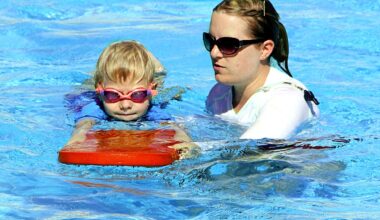The Role of Coach-Athlete Relationship on Swimmer’s Mental Health
The connection between a coach and a swimmer is crucial for fostering a positive mental environment. Athletes who feel supported often exhibit improved performance and mental resilience. Coaches play an essential role in shaping a swimmer’s attitude towards competition. When a coach communicates effectively and builds trust, athletes are likely to respond positively. Moreover, this bond helps swimmers open up about their concerns, which can prevent performance anxiety. Building this relationship requires time and consistent effort from both parties. Recognizing individual swimmer’s needs is essential for tailoring coaching strategies. Regular check-ins during practice can allow for developing a rapport. Furthermore, encouraging swimmers to voice their thoughts promotes a culture of honesty and support. A coach should strive for emotional intelligence, which includes understanding feelings that athletes encounter in and out of the pool. Hammering out the differences in their communication styles, coaches should adapt their methods. A productive relationship can lead to an optimal environment for training, promoting the swimmer’s mental health and overall happiness with the sport.
Trust as a Foundation
Trust is a vital component of the coach-athlete relationship, particularly in swimming. Trust fosters confidence, and confidence enables swimmers to push their limits. Establishing trust requires transparency, where coaches provide constructive feedback. A trusting environment allows swimmers to be open about failures and learning opportunities. This type of relationship encourages athletes to take risks, necessary for growth. When athletes trust their coaches, they feel more secure in trying new techniques and strategies. Additionally, eliminating fear of negative judgment can enhance their focus during competitions. Coaches should emphasize consistent communication, which reinforces trust. For instance, regularly discussing training goals helps swimmers see progress while understanding the bigger picture. Transparency in discussing performance expectations can also align both coach and athlete in mutual objectives. Creating an atmosphere where athletes feel valued is essential. This encouragement leads to emotional safety, crucial for navigating obstacles. Swimmers should be able to express doubts without the fear of repercussion. The positive effects of this relationship extend beyond the pool, impacting swimmers’ lives. Thus, trust truly becomes the foundation for a successful coach-athlete dynamic.
A supportive environment plays a critical role in mental health for swimmers. Such surroundings foster resilience and promote personal growth. A coach’s understanding of psychological factors can optimize training sessions and enhance focus. Implementing mental training techniques boosts performance by decreasing anxiety and increasing concentration. Coaches can teach relaxation methods, breathing techniques, and visualization, providing athletes with valuable tools to manage stress. This proactive approach can help swimmers calm pre-competition nerves. Mental health is often overlooked but is equally significant as physical conditioning. Coaches should prioritize creating a mental support framework alongside physical training regimes. Establishing routines that encompass both physical and mental preparation can lead to improved outcomes. Regular discussions on mental well-being create awareness and highlight its importance. Furthermore, including team-building exercises can strengthen bonds among swimmers. These interactions contribute to a positive team atmosphere that extends beyond individual relationships. Swimmers who feel connected to each other promote a more collaborative spirit. Thus, focusing on both mental and physical health as intertwined aspects leads to more empowered athletes, ready to take on challenges while enjoying the sport.
Communication and Feedback
Effective communication within the coach-athlete relationship is fundamental for mental health. Open dialogue allows athletes to express their feelings, discuss concerns, and articulate their goals. Coaches must cultivate an atmosphere where feedback is constructive and non-threatening. Utilizing specific language encourages athletes to engage actively in their development. Furthermore, regular feedback sessions can be life-changing for a swimmer’s mindset. Highlighting strengths while addressing areas for improvement fosters a balanced perspective. Coaches should encourage self-reflection, allowing athletes to assess their thoughts and feelings objectively. Implementing structured feedback helps swimmers visualize progress, a powerful motivator. Approaching feedback with empathy is paramount; the right tone can transform a potentially negative experience into an opportunity for growth. Additionally, active listening is essential for understanding a swimmer’s unique perspective. When athletes feel heard, they are more receptive to feedback and guidance. Enhancing mutual understanding strengthens their relationship. The emotional aspects of swimming cannot be overlooked; positive reinforcement has far-reaching effects on a swimmer’s self-esteem. Thus, prioritizing communication remains crucial in constructing a healthy coach-athlete dynamic.
Injuries, performance lapses, and competition stress can significantly impact swimmers’ mental well-being. Coaches must recognize these challenges to support athletes effectively. Developing coping strategies is essential for nurturing resilience during tough times. Mental health education should be integral to training practices, equipping swimmers with tools to cope with pressure. Coaches can encourage mindfulness techniques, which enhance emotional regulation and decrease stress. Collaboration with sports psychologists may further benefit athletes. This expert perspective can introduce tailored approaches while complementing coaches’ methodologies. Regularly discussing mental health resources helps swimmers feel less isolated in their struggles. Creating team support systems fosters unity; swimmers can discuss their experiences in a safe space. Encouraging peer support enhances collective resilience, building awareness of shared challenges. Coaches should facilitate these conversations while remaining approachable. Incorporating mental health workshops may also encourage swimmers to explore self-care strategies. Engaging an entire team in these discussions solidifies the acknowledgment of mental health matters. Swimmers should feel encouraged to prioritize mental well-being without stigma. Ultimately, addressing mental health openly cultivates a more robust and fearless swimming atmosphere.
Positive Reinforcement and Motivation
Motivation through positive reinforcement proves instrumental in developing swimmers’ mental health. Coaches who celebrate small victories can build a swim team’s confidence and commitment. Recognizing effort, rather than just results, fosters perseverance in athletes. Establishing a culture of appreciation can motivate swimmers to push their limits continuously. Swimmers need to feel validated, especially when experiencing setbacks. Creating rewards or recognition systems encourages ongoing involvement in training and competitions. Coaches can adopt strategies like personal best charts or acknowledgment boards to promote motivation visually. Additionally, personalized feedback, tailored to each athlete, enhances their unique journey. Swimmers should feel appreciated for their distinct contributions to team success. When coaches highlight individual progress alongside team goals, swimmers become more engaged and driven. Furthermore, incorporating fun activities or friendly competitions adds a positive atmosphere. Understanding that sports should also be enjoyable encourages commitment while alleviating stress. Balancing competitive drive with positive experiences is key to sustaining passion for swimming. Thus, implementing positive reinforcement creates an environment where swimmers thrive physically and mentally through their collective journey.
The longevity of an athlete’s relationship with a coach impacts mental health profoundly. Consistent guidance over time equips swimmers with the clarity needed for excellent performance. Coaches who prioritize remaining present and actively involved provide stability during various phases of training. This long-term collaboration fosters depth in understanding the athlete’s evolving needs and challenges. Swimmers learn to trust their coaches fully, benefiting from knowing that guidance remains available throughout their careers. Additionally, this relationship often extends beyond the pool, contributing to personal development. Coaches can aid swimmers in navigating life transitions or preparing for future challenges. Lifelong relationships encourage swimmers to turn to their coaches even after leaving the sport. By maintaining connections, athletes feel an enduring sense of support that can significantly impact mental health. This considerably diminishes feelings of isolation during tough times. Encouraging continuous bond-building also lays the foundation for future generations of swimmers. The trust established transforms not only the current athlete’s experience but also the culture within swimming programs. Cultivating positive relationships ensures that mental health remains at the forefront of every swimmer’s journey.
In conclusion, the association between coach-athlete relationships and swimmers’ mental health cannot be overstated. Effective communication, trust, and positive reinforcement create an environment for growth. The impact of a supportive coach extends beyond merely providing technical expertise. Emotional support, active listening, and regular feedback form the backbone of a healthy coaching dynamic. This relationship serves as a catalyst for improvement, shaping confident, resilient swimmers. Additionally, prioritizing mental health alongside physical training is critical for developing well-rounded athletes. Emphasizing psychological well-being results in swimmers who navigate pressures and challenges with grace. To maximize performance, coaches should integrate mental health education into training routines. Essentially, the role of coaches goes beyond technical guidance; they become mentors who influence athletes’ overall well-being. A healthy coach-athlete relationship promotes persistent motivation, fostering passion and commitment. As mental health continues to gain attention in sports, embracing this responsibility is essential for coaches. By creating an environment of trust, open communication, and consistent support, coaches enable athletes to succeed both in and out of the pool. This holistic approach ultimately leads to a brighter, healthier future for swimmers.





